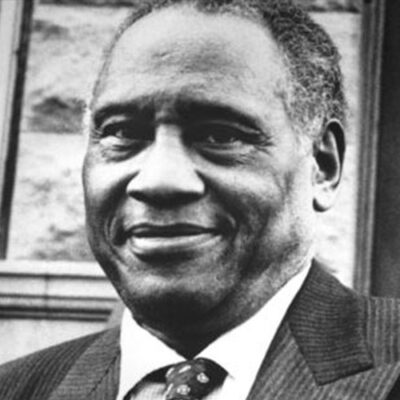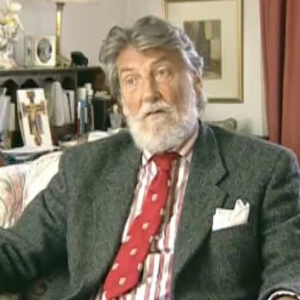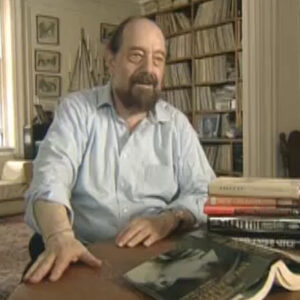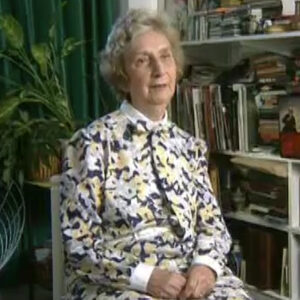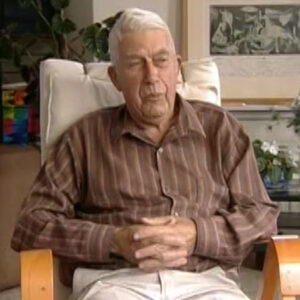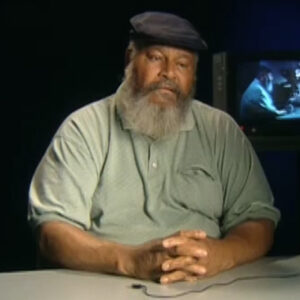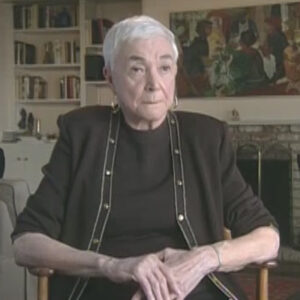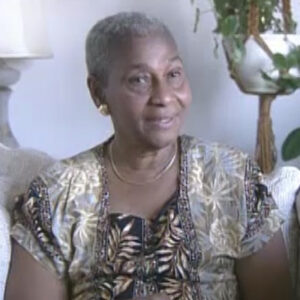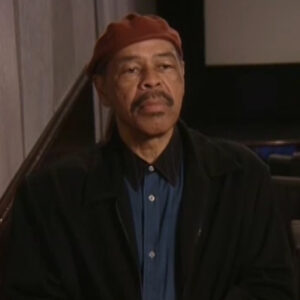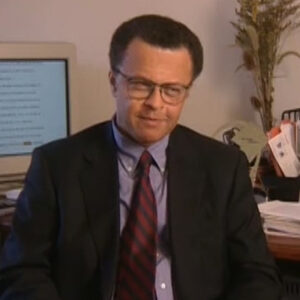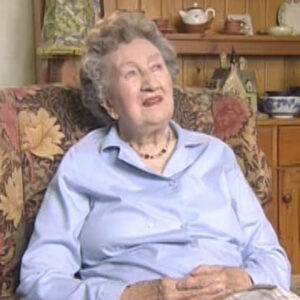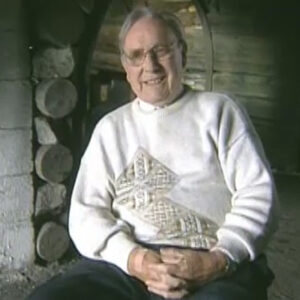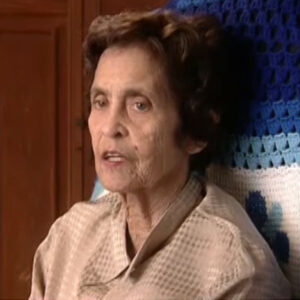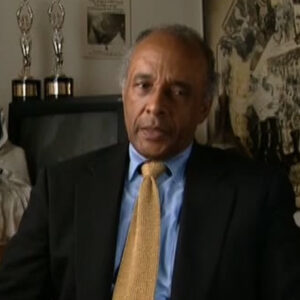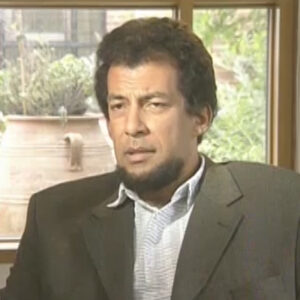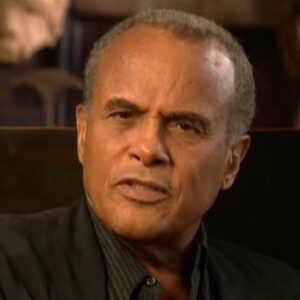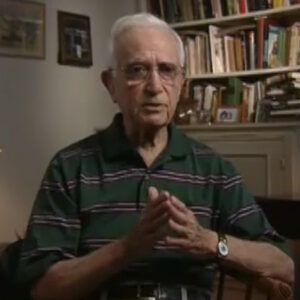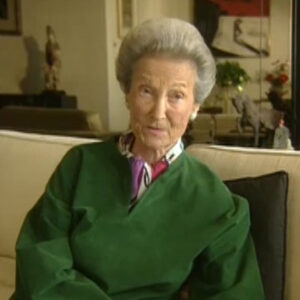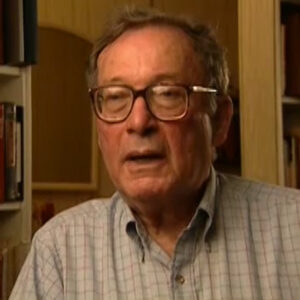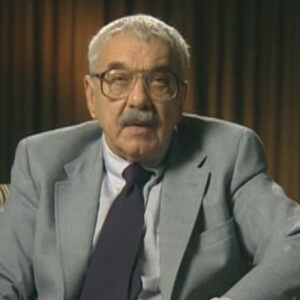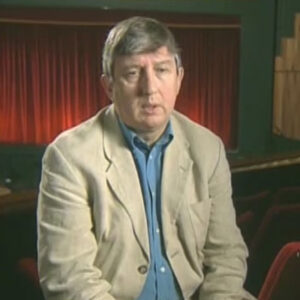Speaker Well, I don’t remember the first time I actually saw him, it would have been in the film because I didn’t see him first in person and I don’t know what film I saw him in, but I do know the first time I saw him in person was in Detroit in the 40s when he was doing Othello with Hosai for Arnold Hagen. And they came to town and I went and I saw the production of Othello and invited him to the fraternity house to meet his fraternity brothers in Detroit. He was an Alpha Phi Alpha, which I was, and I was president of the organization in Detroit Time. And I was in school. I was at Wayne University and we invited him over and he came over to the frat house and chatted with all of us. So I didn’t have a private conversation with him. But that’s when the first time I encountered him in person.
Speaker Theater wise, what did you think of the performance in Detroit where you find him to be committed to it?
Speaker I was in the throes of making the commitment. I had like gone to college as a pre law student and I was in that process and coming to the point where I was going to have to make that ultimate decision, the one that has to do with your life, what you’re going to do with your life. And I had by that time gotten intrigued with theater, not because I had the opportunity to do that much, because at Wayne University in those days, in the early forties, they were not giving their theater for me. There were no black persons in the theater club group at Wayne at the time. I was one of the people who had become somewhat prominent in the theater, in the speech department by virtue of other things that I was doing. But it was not geared to me. So I wasn’t doing theater, but I wanted to very much and I was doing interpretive reading. That’s what I used to call it. Then when we take programs of poetry out into the community and I wasn’t doing it because they weren’t doing shows with a part for me and they weren’t into considering of what do they call it now.
Speaker It’s been called so many names, but it’s not designated casting at that point. Before I left right when I was invited to do a show at the show at the university theater, which I did. But at that time I wasn’t. However, I was very intrigued by theater and wanted very much to go into it and would shortly after that make that decision. And Paul was very important in making that decision. He was he and candidly were the only role models that I can remember that I looked to at all, you know, and I looked at myself and I looked at Paul and I said, well, I’m not fat, so I’m not going to be that I’m not going to go out there and nobody’s going to take me for the deep resonance of my voice nor the bigness of my stature.
Speaker But I might be a decent actor and there might be something for me to do. And I my biggest hurdle, of course, was not the fact that there was no opportunities out. There are very few. But what do I say to my mother, who really was looking forward to my being a doctor and I had already reneged, done that and was now going to be a lawyer and she had adjusted to that. And how would she adjust to the fact that I wasn’t even going to be a lawyer, but I was going to go into this No-Name profession where there was no possibility of acquiring anything, certainly stability or security. And that’s what I was going to college for. She thought for security.
Speaker And I had to take really stock myself and ask myself that question rather directly. What is security for me is security money in the bank? Is security. Having a home that one is paid for or is paying on? Is one having a bank account? Is that security?
Speaker Are security getting up in the morning and not counting the hours, and I decided that for me security was that getting up in the morning and not counting the hours and in the theater was a place where I did not count the hours where you simply do the work and you live off the doing of the work. So you’re not in it trying to get home. You’re in it trying to accomplish it. And so it was shortly after I did encounter Paul, who was a factor in that decision that I decided to commit to the theater.
Speaker How did how do you think?
Speaker How do you think you have adjusted to Paul, especially during that tour?
Speaker How do you feel because you’re a family person? How do you think his presence?
Speaker I think his presence affected theater, surprisingly. I think people approach a question like that with with preconceived ideas. They either know that they are that a black man should not be doing that role or because it’s only white people who have done Othello up to now are they are they cannot stand the possibility of seeing a black man on stage with a white woman, and that is going to be insightful or whatever.
Speaker So they approach it generally with preconceived notions. And it is something that I have always felt that the experience itself is something that transforms people. If they are to be transformed, they learn from going through it, from experiencing it. And I think that what happened to the theater and with Paul doing what he did was that all of the preconceived notions that people wanted to see lived out because it was what they believed were challenged and very often changed and significantly changed.
Speaker Uh, do you know the, um, the controversy around, uh, all God’s children got wings, and it seems as though it seems that those issues basically are alive today. You know, with this introduction, you kind of comment on that which you put out there with threats.
Speaker Yes, I know which new production? The, um, Corpus Christi. The Corpus Christi.
Speaker Because they said they announced they were going to do it.
Speaker Oh, you’re talking about with Paul?
Speaker Well, yes. In other words, I’m trying to draw a parallel. You were just talking about the past.
Speaker Yeah, right.
Speaker I mean, the same things that affected the production of its its operative to some degree all the time. I you know, it is I am really personally bored with going through that cycle of casting, you know, and how do we cast what we get. It’s like every generation has somehow got to come to terms with that and they can’t take it from the past. They have to take it from now. So in some respect, in many of the things that you do in many of the parts of this country, you’re still encountering that prejudice, whatever level that might exist, that whether it’s very prevalent, whether it is slightly removed or suppressed, it exists and it exists in hopefully fewer and fewer people.
Speaker But it does exist and it has to be dealt with. Do you think that there.
Speaker Do you think that there is a call to question if Paul Robeson were alive today? What do you think he would say about the.
Speaker Well, he would have to reckon it’s changed a lot in many respects, are you look at a theater now and theater is the object of this generation.
Speaker It is what they are creating on the stage. It is even past my generation now. I’m a part of the tail end of it. But there is a different theater being created out of a different sensibility. And that was happening and it happened continually. But that is a part of it. And the prejudice and preconceived notions about race and I do say preconceived notions because most of the notions do not come from experience.
Speaker They come from things that are implanted in people’s minds and in their psyches and in their heads that they’re handed down over the dinner table, over the breakfast table, wherever they get them from and they bring them with you. It’s part of the baggage.
Speaker Well, OK, so so ROWSON as a black male image in the film, for example, what kind of baggage do you think came with that and what do you think?
Speaker I think he overcame a great deal. First of all, he had to overcome, you know, the the silent or hidden objections of the people around you, the people closest to you, that the people who are going to offer you the opportunity to do it have to deal with it. The people who are going to offer you the opportunity to do it have to deal with it themselves before they can say, will you do this? So there is that residue that’s even hanging there and then the whoever else may be involved.
Speaker Now, there are places in this country where the any kind of a negative reaction may be quite overt still, but one hopes that most of it is is somehow dealt with.
Speaker Are there a little bit ashamed even if you don’t transform them? Yeah.
Speaker And the performance that you saw was a mixed performance in the audience.
Speaker The audience was mixed.
Speaker Yes, I saw it in Detroit, you know, so we had in there very positive, very positive reaction to a fellow that, you know, I think the people who saw Robson’s a fellow saw the fellow, as it should have been. Now, within that one may quarrel or taking exception or evaluate individual performances, individual aspects of production.
Speaker But I think that the combination of Woodhaven and José Forever and Rabson kind of filled everybody’s image of a fellow of what a fellow ought to be. I thought that Paul Robeson was my fellow.
Speaker Now, does that mean that I thought he was the world’s greatest actor? No, I did not. But I thought that the greatest possibility for achieving the possibility that exist in that role and in that play were alive on the stage.
Speaker How would you rate the night at the time?
Speaker The time inadequately trained. I didn’t see him as a trained actor. I saw him as a very sincere, very powerful, very committed human being who was there and when I could blend that with a fellow that’s the finest Othello.
Speaker But when you get down to what really were the techniques of acting that permits you to utilize yourself in various ways, I did not think he was trained in that respect.
Speaker You know, we have to say that that’s that’s true. That’s.
Speaker Yeah, it was interesting to hear your comment on. It’s not about walking around, I know, but. OK, is that OK, that’s a little better. Yeah, I mean, I’m trying to get a handle on on his, uh.
Speaker His craft as an actor and because it seems to me that what you mentioned of his persona was much greater than the craft, but maybe I think it matters.
Speaker Oh, yes, it matters to those who know.
Speaker I mean, what what you always have to figure in in the audience when you’re doing anything is that in every audience there’s at least one person.
Speaker Who really knows, and that’s the person you’re working for, you know, and even if that person isn’t there, you are there and you know, so I always knew that in any performance, somebody is there who really knows what is happening, what’s working, what isn’t.
Speaker And Paul had everything going for him in terms of his physical self, his vocal self and his mind. But it was not unified into a thing called the craft of acting.
Speaker You know, I use this. Yes.
Speaker How did he do you have any idea how he perceives himself?
Speaker No, I never talked to him about how he perceived himself as next. No, I never got that close to I.
Speaker I saw Paul in Othello twice.
Speaker I feel I saw almost the bookends of it or the middle portion and the end portion, and I saw him when he came to Detroit, when he was doing it and he came over to the fraternity house, I saw him there and I saw him backstage in Stratford on Avon and talked to him then. But we never talked about craft.
Speaker When you saw him at Stratford. You had done to me you were free, you were in theater. Yes, so it was was it a ceremonial visit or was it?
Speaker No, it was not a ceremonial visit. We were in London, Barbara and I, Barbara, being my wife. We were doing A Raisin in the Sun. In London, and I knew he was at Stratford doing Othello and I could not pass up that opportunity. So we took the train, we went down Stratford and we saw a matinee performance of Othello. And I went backstage unannounced to see him. And there seemed to be nobody to announce myself to at that time.
Speaker And there was a very different Paul Robeson there than I had met before.
Speaker Could you tell what the difference is?
Speaker I would say I encountered a very fatigued human being. Not just fatigued from the performance that he had just done, he was sitting there and he was a tired human being and I don’t say a tired actor. Because the fatigue from that is slightly different, I thought there was a greater fatigue, a deeper fatigue in him, as a matter of fact, it surprised me and I thought that we should not stay because he needed the time, he needed the rest, he needed to recover himself.
Speaker And so we didn’t stay long. But that was my last impression of Paul, and it was very different from the first young man that I had encountered. You know, it’s the picture I have of him because I do have a picture of of Paul and the rest of my fraternity brothers on the steps of the fraternity house in Detroit.
Speaker And there is it’s the it’s the almost I won’t say typical Paul Post, but the hands crossed in front of him, the bigness of stature and the smile that was as big as he was. And then all of these young men around him. My image of that picture is a Christmas tree, and he is the tree and we are the ornaments. And indeed we were, because that is what we wear. We look to him to support us, you know, and that’s what I felt about him, that what he had done and the trails that he had blazed. And one must know when you blazed trails that some of them are going to go in the wrong direction and you’re going to have to come back and go another way. The trails that he had blazed at least showed us some things about where to go or the consequences of going up. This route are another route. And and Paul was that so he was that kind of a center for all of us. He wasn’t a center who disappeared. And you had to go find him somewhere. He was always there. And where he stood, whether you agreed with him or didn’t agree with him, you knew where he was or at least where he is purported to be out of what was coming out of his mouth and where he was purported to be out of what was coming out of other people’s mouths, which you didn’t have to agree with either, I believe.
Speaker But Paul did not disappear despite the fact that there were those efforts to make him disappear.
Speaker Didn’t disappear. No. Your question?
Speaker Were you aware during the tour, I mean, everybody now acknowledges that it existed, so there was not a big thing about it, but there was a relationship going on between you and Paul. Were you aware?
Speaker I wasn’t aware of that.
Speaker ARIADNI or if it had been mentioned, it somehow either went through my consciousness or it wasn’t a factor in my I say relationship rather than feelings about my relationship to Paul Robeson, his personal life, you know, with his personal life.
Speaker And I believe that about other people, too, including our presidents, they’re entitled to a personal life. Give my personal Paul had a personal life that was not a part of whether I was going to go into the theatre or what I was going to do in the theatre or not. It was so if I heard it, it went in, went out fine, because I was wondering if I mean, for those times it’s a pretty volatile rumor.
Speaker So I would think people would freak out.
Speaker But now in our was if I heard of it or not, it’s not a freak about subject for it. No, no. There are other things I find that are that are truly important that I might freak out about, but not that.
Speaker Well, speaking of freak out, a little subject, is there anything about Roxanne that you would put in that category that sort of makes you scratch your head?
Speaker Well, choices of some of the plays in the.
Speaker I will go back and look at some of the things he did, but and I might have questions about it, but I have to always know that it’s in context. And what I really have to examine is not the act, but the context within which the act existed.
Speaker There are things that black people went through in the past that were really horrendous and really put pressures on in terms of making decisions and knowing that Paul and many people like him was operating half the time, not just for yourself, but you were functioning with a consciousness of what this meant to your people in this time that you were did not have the luxury of individuality and that Paul never had that luxury. From the time he ran the first football down the field of really functioning for himself, you know, and sometimes when he did, it was made public things, whatever. But you know that what you saw wasn’t the totality of the picture, that there are other things that are outside the frame that you can’t see.
Speaker And those are factors that that you have to give some kind of credence to. Tremendous pressure is all I can know today, is that he lived with pressure constantly. He made some choices that I personally may have questioned. But I know that he did not make them in an effort to destroy me or to destroy black people. He may have made a mistake.
Speaker But now his goal was not the destruction of me or my race.
Speaker You know, the coming from you know, you’re no stranger to political issues and theater or that kind of stuff. So let me ask you this. In many instances, Paul took positions that even some of the traditional leaders, you know, took shots at him for. So in line with your comment about you have to look at the context. While he didn’t do things to destroy you or me or black people, sometimes he said things that some black people said a little harder.
Speaker I mean, as an artist yourself, how do you interpret that? In a way?
Speaker Well, it’s.
Speaker Know, we’re not speaking of a specific political issue, and I was not totally involved in the politics of the time, it’s where you are, where the questions that came to you were properly framed by properly. I mean, with the total information involved. There were things that did happen. And I can’t be specific about that because I don’t remember them exactly in relation to his support of certain Russian positions or Stalinist positions. Let me let me say that in divorce it from the Russian people, because I think that’s a different thing that that I could not agree with.
Speaker Or did not support at the time and felt saddened in an area of my heart that Paul did know, I, I had to be disappointed about that in a very personal and political way. So those things did happen. But I try again not to let that sway me to a point where I. Would be against Paul Robeson.
Speaker What I am what I think is so important, and I did have a very sad feeling some years ago when I was teaching in a college in New York and I was teaching a course in Black Studies. Yeah. And I mentioned certain names and it’s very strange.
Speaker And I look at a class of people, a sea of faces and see blackness. And when I mention the name of Paul Robeson and saw blindness in that classroom, I was terrified because something very important. Was missing from the education of these people who had come all this way. And did not know this person, and so I had to send them out to define them, dig up things about it, because I felt that at that point Paul was passing through what I call, I guess, the black hole of history, where we all think at a certain point, you know, we go on and life is continued.
Speaker But there is a point at which we disappear and it is only through the consequences of the energies that we have exerted in our lives and the concern of certain other people.
Speaker That that personality may emerge from the black hole and get into history and, well, one of the things that you have to be aware of is the theater and its material. So what is the material of the theater that there is there? Until recently, there has been very little that has emerged year after year with roles.
Speaker Appropriate roles are good roles for black actors.
Speaker If you want to hang around and do the maids and the butlers and whatnot and the and the you know, there was a time in film if you go back and film and look at your films, black people did not walk down the streets of New York. You just weren’t there and anybody from a foreign country looking at film would not believe that black people existed in this country didn’t exist, or you could drive across this country from one end to the other. All right. Could and never see my face on a billboard. Or never see black people kiss.
Speaker You our display affection to one another, you know, that was what we were living with, where you were not being fortified by the advertising agencies and as other writers were that and that you were not being really fortified in the theater. They weren’t telling stories about us unless you were supportive of somebody else’s story. So there was very little for Paul to go through to from one season to another or be invited to do so. So it’s it it’s hard to maintain a stature that was once he made an impact.
Speaker So you’re saying they just like it, they roll it back.
Speaker There’s nothing for him to do. So after you do a fellow, what do you do? You know, what is there, what is the material? Now we begin to have some writers writing black material so other that you are dependent on a white person’s conception. Of you as a black person and how they may stick you into stories of their lives. Now, in terms of the image that and stature that Paul had reached, what was his next step?
Speaker So there were plays being done all the time, new plays being written.
Speaker But not for him.
Speaker So there it is to in order to even know it in films today, it’s not only a matter of getting the first one, it’s not a what do you do next? What’s the next thing that you do to sustain and progress?
Speaker That image, do you think that the. The way you are talking about us being reliant on other people’s ratings, do you think? That Provincetown players Eugene O’Neill, what would you put those his early efforts in that category of thought of being dependent upon?
Speaker You know?
Speaker Absolutely.
Speaker He was not the producer of private players. The Provincetown players were also subject to the literature. What do they got to work with?
Speaker You know, you’ve got Paul Robeson, you think it’s a wonderful you’ve got a wonderful actor, you’ve got a great potential here. You’ve got a powerhouse. So what do you get him to do? Yeah.
Speaker Yeah, so did you actually do during her?
Speaker And he played said, why not, but the head’s word in that position at that time? No.
Speaker Yeah, they weren’t. So if you look around and after Othello where you. Yeah.
Speaker And just to go back to all God’s children that we get. Uh, would you do you think that that was an example of good intentions pushing the envelope, I mean, good intentions that again suffered from.
Speaker The fact that the playwright did not really understand from a black person’s point of view, the subject he was writing about good intentions. But a lack of knowledge and a lack of real intimate knowledge. So you end up with all God’s children. Or you end up even with the Emperor Jones.
Speaker Because the the things that are involved for a black person. In those circumstances are much deeper.
Speaker Then what is represented in those plans and much more intricate and and much more intelligent? Then what is represented there, and I think it is laudable for Eugene O’Neill to want to write about it.
Speaker And I thought it was in Fort unfortunate that there wasn’t some talented black playwright. To write about it from a black point of view, of course, it was Negro, that it was worse than what it might have been.
Speaker I think it was still a Negro. It hadn’t quite got into it, you know.
Speaker So how would you characterize.
Speaker The reason I mean, there was there was a wind chill came out, there was a wave of protest, right. And the theater people, like, hung in and resisted it. Yeah. I mean, it’s sort of like good intentions, bravery upon.
Speaker But that story has compounded itself so many times.
Speaker You know, the the theater in Washington, the capital of our country. Used to segregate audiences. You know, you couldn’t go to the theater in Washington, sit where you want to sit. Got my one of my worst experiences in the in the in my life in the capital of my country.
Speaker I was on my way to Virginia from the north to to take part in my sister’s wedding, who was marrying a soldier who is in the army. So I was going to go down there and be a part of the wedding, so I did, I arrived in Washington where you change trains. And they pointed me to the first coach I wanted to go and another coach and they said, no, that’s the coach for you. I went and I looked at the couch, it was wooden.
Speaker And did it have air conditioning? No, it had screens in the window behind a locomotive that was chugging out fenders, so every black cinder that came from the the engine came into that coach. And as we pulled out of Washington, D.C., I could see the dome of the Capitol.
Speaker I said, this is my country, OK?
Speaker So it did. I had experiences even coming later than Paul, where we had to fight our way to the theater because we were doing theater of protest.
Speaker At that time, you know where and that’s where I learned that an open Coke bottle is a weapon.
Speaker A Coke bottle in a paper bag, it’s not a weapon. And that if I was going to the theater from where I had to walk a few blocks from where I got off the bus or whatever, I should carry a Coke bottle in a paper bag.
Speaker To defend myself, just to get to the theater, to function, you know, I’ve been in the theater doing a play over on what is now called Hell’s Kitchen, where the theater itself was invaded by a gang of people who threw chairs onto the stage while we tried to perform. OK, this is after Paul and those manifestations. Of ignorance. But I have segregated attitudes still exist. When I hear just last week.
Speaker About these men tying a man to the back of a truck. And dragging him to his head is decapitated.
Speaker This is civilization.
Speaker But this is a lingering manifestation of very disease conditions that you’re struggling with constantly.
Speaker Now, you said you did see the protest, but as far as I know, Paul never did that, I guess is the difference this time difference?
Speaker You know, you don’t just do theater of protest, but that’s what’s there with a place that offered you anything to do.
Speaker Were those planes otherwise, you hung around and did a survey, did this, that or the other, but trying to work off Broadway, on Broadway, these were the plays that emerged that may have had meaningful roles for black artists.
Speaker So, I mean, basically you I mean I mean, basically you saw.
Speaker Do you think Paul was a role model or.
Speaker A barrier breaker. You know what I mean? The difference is one is somebody who does a traditional job well. And I encourage you to go beyond that, and then a barrier is somebody who might not even do it. Well, he does. He just pushes the envelope a little.
Speaker I don’t see Paul as out to just push the envelope. I felt that Paul wanted to be a very major actor.
Speaker I think deep within himself, he. He demanded the best of himself to the best that he knew.
Speaker But always he wanted to be excellent in what he did, and you see that translate into being right. Politically. In what he did also, though, there’s not a big difference between those two things.
Speaker He was not in the art just for the art.
Speaker So he was in the art both in terms of what it did for him and what he could say with it.
Speaker Yeah, how do you think he was more successful in theatre than in film in doing that? I mean, what do you think?
Speaker You might have had to have seen all of his theater and all of its films.
Speaker What are you in the theater? I mean, how would you evaluate? Well, yeah.
Speaker Yeah, I mean, I didn’t say I saw his, uh. It’s a fellow I understand from my point of view, he did three Othello’s one when he was very young, which I didn’t see one when he was a proper age, and that I did see and one when I thought he was tired and fatigued.
Speaker And you talked about having seen I’m tired after the performance. Did you see that tiredness in the performance as well?
Speaker Not yes. Yes and no. Yes. When you can see that someone is.
Speaker Almost straining. To be where he ought to be, where he knew he ought to be.
Speaker And then you say that fatigue. You can see it in athletics also.
Speaker The impact of Paul and Othello, both on Broadway and on the road. Do you think that the impact was different? The black people in the audience. That on the white people in the audience.
Speaker Oh, yes, yeah, uh, if they. There is with black people, our whites at that time, not our history of theatergoing. So it was not in it was not an aspect of our culture. I know that nobody in my family went to the theater.
Speaker They didn’t know. And there was good reason, you know, there was nothing down there that was about us. You know, they aren’t telling our stories down there. Why should we go?
Speaker And so there is there had historically been very little theater involvement.
Speaker However, when a black person makes a venture into these areas, the community goes with you to support you. And black people would come out for something like that, would come out to see Canada, would come out to see Paul Robeson, would go to the theater. For those reasons, they had a reason to go.
Speaker So it’s the so it affected the black community in a different way than it affected the white community who goes to the theater and goes to see another production of Othello to compare with the other productions of Othello that they have seen.
Speaker There are two different reasons for going to the theater with very good reason. Yeah.

